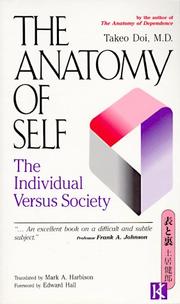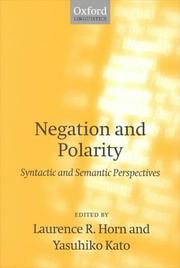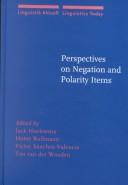| Listing 1 - 10 of 23 | << page >> |
Sort by
|
Book
ISBN: 9789085750154 9789044121285 Year: 2007 Publisher: Antwerpen Apeldoorn Cyclus
Abstract | Keywords | Export | Availability | Bookmark
 Loading...
Loading...Choose an application
- Reference Manager
- EndNote
- RefWorks (Direct export to RefWorks)
Informatietheorie in de geneeskunde --- Information theory in medicine --- Polariteit (Geneeskunde) --- Polariteittherapie --- Polarity (Medicine) --- Polarity therapy --- Polarité (Médecine) --- Polarité thérapeutique --- Therapie [Polariteit] --- Therapy [Polarity ] --- Théorie de l'information en médecine --- Thérapeutique par polarité --- Physiotherapy. Alternative treatments --- polariteit --- alternatieve geneeswijzen

ISBN: 0870119028 Year: 1988 Publisher: Tokyo ; New York : Kodansha International,
Abstract | Keywords | Export | Availability | Bookmark
 Loading...
Loading...Choose an application
- Reference Manager
- EndNote
- RefWorks (Direct export to RefWorks)
Self. --- Polarity (Psychology) --- Individuality. --- Individuality --- National characteristics, Japanese. --- Moi (Psychologie) --- Polarité (Psychologie) --- Individualité --- Japonais --- Social aspects --- Aspect social --- Polarité (Psychologie) --- Individualité
Book
Year: 1972 Volume: Bd. 37 Publisher: Berlin : Duncker & Humblot,
Abstract | Keywords | Export | Availability | Bookmark
 Loading...
Loading...Choose an application
- Reference Manager
- EndNote
- RefWorks (Direct export to RefWorks)
Polarity (Philosophy) --- Polarity (Biology) --- Polarity (Psychology) --- Physics --- Contraires (Logique) --- Polarité (Psychologie) --- Physique --- Philosophy --- Philosophie
Book
ISBN: 9782841975099 Year: 2009 Publisher: Escalquens / Paris Editions Trajectoire
Abstract | Keywords | Export | Availability | Bookmark
 Loading...
Loading...Choose an application
- Reference Manager
- EndNote
- RefWorks (Direct export to RefWorks)
lignes de force électromagnétiques --- le sol --- les courants telluriques --- la polarité de l'individu --- forces naturelles --- thérapies
Book
ISBN: 9783110303728 9783110305234 3110305232 3110303728 Year: 2013 Publisher: Berlin : De Gruyter,
Abstract | Keywords | Export | Availability | Bookmark
 Loading...
Loading...Choose an application
- Reference Manager
- EndNote
- RefWorks (Direct export to RefWorks)
The grammar of negative polarity items is one of the challengesfor linguistic theory. NPIs cross-cut all traditional categories in grammar and semantics, yet their distribution is by no means arbitrary. Theories of NPI licensing have been proposed in terms of syntax, semantics, and pragmatics - each with its own merits and problems. The volume comprises state-of-the-art studies and suggests an interpolation approach to NPI licensing.
Polarity (Linguistics) --- Grammar, Comparative and general --- Context (Linguistics) --- Polarité (Linguistique) --- Négations (Linguistique) --- Contexte --- Negatives. --- Polarity item (Linguistics) --- Linguistic analysis (Linguistics) --- Negatives (Grammar) --- Situation (Linguistics) --- Linguistics --- Context --- Philology
Book
ISBN: 9780199697977 0199697973 9780199697984 0199697981 0191643602 019176597X 9780191643606 9780191765971 Year: 2013 Volume: 2 Publisher: Oxford : Oxford University Press,
Abstract | Keywords | Export | Availability | Bookmark
 Loading...
Loading...Choose an application
- Reference Manager
- EndNote
- RefWorks (Direct export to RefWorks)
In a fundamental investigation of language and human reasoning Gennaro Chierchia looks at how syntactic and inferential processes interact through the study of polarity sensitive and free choice items. He reformulates the semantics of focus and scope and the pragmatics of implicature as part of the recursive semantic system.
Polarity (Linguistics) --- Polarity item (Linguistics) --- Linguistic analysis (Linguistics) --- Polarité (Linguistique) --- Polarity (Linguistics). --- Logic --- Philosophy of language --- Grammar --- Pragmatics --- Language and logic. --- Langage et logique --- Polarité (Linguistique) --- Grammar, Comparative and general --- Categories, Grammatical --- Grammatical categories --- Categorization (Linguistics) --- Componential analysis (Linguistics) --- Grammatical categories. --- Major form classes --- Linguistics --- Philology
Book
Year: 0000 Publisher: S.L. www.lulu.com
Abstract | Keywords | Export | Availability | Bookmark
 Loading...
Loading...Choose an application
- Reference Manager
- EndNote
- RefWorks (Direct export to RefWorks)
theosophy --- mysticism --- Kulapathi Ekkirala Krishnamacharya --- H.P. Blavatsky --- A.A. Bailey --- psychologie spirituelle --- polarité --- principes planétaires --- anatomie spirituelle de l'homme --- la substance non-matérielle --- les pôles de la terre --- occultisme --- méditations
Book
ISBN: 9780521792400 0521792401 9780511975288 9781316606445 9781139158749 1139158740 1283342154 9781283342155 9781139160797 1139160796 0511975287 9781139156981 1139156985 9781139156981 1107218098 1139152416 1139159798 9786613342157 1139155237 1316606449 Year: 2011 Volume: 127 Publisher: Cambridge Cambridge University Press
Abstract | Keywords | Export | Availability | Bookmark
 Loading...
Loading...Choose an application
- Reference Manager
- EndNote
- RefWorks (Direct export to RefWorks)
Many languages include constructions which are sensitive to the expression of polarity: that is, negative polarity items, which cannot occur in affirmative clauses, and positive polarity items, which cannot occur in negatives. The phenomenon of polarity sensitivity has been an important source of evidence for theories about the mental architecture of grammar over the last fifty years, and to many the oddly dysfunctional sensitivities of polarity items have seemed to support a view of grammar as an encapsulated mental module fundamentally unrelated to other aspects of human cognition or communicative behavior. This book draws on insights from cognitive/functional linguistics and formal semantics to argue that, on the contrary, the grammar of sensitivity is grounded in a very general human cognitive ability to form categories and draw inferences based on scalar alternatives, and in the ways this ability is deployed for rhetorical effects in ordinary interpersonal communication.
Lexicology. Semantics --- Grammar --- Pragmatics --- Polarity (Linguistics) --- Grammar, Comparative and general --- Semantics. --- Polarité (Linguistique) --- Négations (Linguistique) --- Syntaxe --- Sémantique --- Negatives. --- Syntax. --- Semantics --- Negatives --- Syntax --- Polarity --- (Linguistics) --- (Linguistics). --- Polarité (Linguistique) --- Négations (Linguistique) --- Sémantique --- Formal semantics --- Semasiology --- Semiology (Semantics) --- Comparative linguistics --- Information theory --- Language and languages --- Lexicology --- Meaning (Psychology) --- Negatives (Grammar) --- Polarity item (Linguistics) --- Linguistic analysis (Linguistics) --- Arts and Humanities --- Language & Linguistics --- Linguistics --- Philology --- Grammar, Comparative and general - Negatives --- Grammar, Comparative and general - Syntax --- Grammar, Comparative and general Syntax

ISBN: 0198238738 0198238746 9780198238737 Year: 2000 Publisher: Oxford: Oxford university press,
Abstract | Keywords | Export | Availability | Bookmark
 Loading...
Loading...Choose an application
- Reference Manager
- EndNote
- RefWorks (Direct export to RefWorks)
Lexicology. Semantics --- Grammar --- Grammar, Comparative and general --- Polarity (Linguistics) --- Semantics. --- Négations (Linguistique) --- Polarité (Linguistique) --- Syntaxe --- Sémantique --- Negatives. --- Syntax. --- 801.56 --- Syntaxis. Semantiek --- 801.56 Syntaxis. Semantiek --- Polarity (Linguistics). --- Négations (Linguistique) --- Polarité (Linguistique) --- Sémantique --- Semantics --- Formal semantics --- Semasiology --- Semiology (Semantics) --- Comparative linguistics --- Information theory --- Language and languages --- Lexicology --- Meaning (Psychology) --- Polarity item (Linguistics) --- Linguistic analysis (Linguistics) --- Syntax --- Negatives (Grammar) --- Negatives --- Linguistics --- Philology --- Grammar, Comparative and general - Negatives. --- Grammar, Comparative and general - Syntax. --- Grammar, Comparative and general Syntax

ISBN: 9027227616 1556197934 9786612163364 1282163361 9027299161 9789027299161 9781282163362 9781556197932 6612163364 Year: 2001 Volume: 40 Publisher: Amsterdam ; Philadelphia : J. Benjamins Pub.,
Abstract | Keywords | Export | Availability | Bookmark
 Loading...
Loading...Choose an application
- Reference Manager
- EndNote
- RefWorks (Direct export to RefWorks)
This study hypothesises that neg-raising is a cognitive phenomenon which arises while the human mind is processing the content of the sentence under the normal assumption of closed world. A 'neg-raised sentence' conveys an epistemic attitude towards the proposition expressed by the subordinate clause. The hedge consists in making it clear that a certain conclusion is compatible with the current information state, but cannot be proven.
Grammar --- Grammar, Comparative and general --- -Polarity (Linguistics) --- Polarity item (Linguistics) --- Comparative grammar --- Grammar, Philosophical --- Grammar, Universal --- Language and languages --- Philosophical grammar --- Negatives --- Grammar, Comparative --- Polarity (Linguistics) --- Grammaire comparée et générale --- Polarité (Linguistique) --- Congresses --- Congresses. --- Négations --- Congrès --- Linguistic analysis (Linguistics) --- Linguistics --- Philology
| Listing 1 - 10 of 23 | << page >> |
Sort by
|

 Search
Search Feedback
Feedback About UniCat
About UniCat  Help
Help News
News